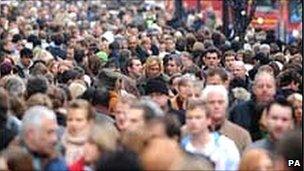Theresa May pledges immigration abuse crackdown
- Published
Theresa May: "The points based system alone is not sufficient"
The Home Secretary, Theresa May, has pledged to crack down on immigration abuse in order to restore public confidence in the system.
In her first major speech on immigration policy, she said the number of non-EU migrants had to be reduced to "sustainable levels".
Between 1997 and 2009, net migration was 2.2 million people - more than twice the population of Birmingham.
A new English language test to combat sham marriages is to be introduced.
Net migration - the difference between the number of people coming to live in the UK and the number emigrating - stood at 196,000 last year.
The coalition government has promised at least to halve this figure by 2015.
This is to be achieved partly with a cap on the number of skilled workers from outside the European Economic Area.
In June, the Home Office introduced a temporary limit of 24,100 work visas for non-EU citizens.
Permanent measures will be brought in from April 2011 but the final decision on the figure is not expected until next month.
Fake documents
Mrs May said public confidence had been undermined by individual stories of the immigration system being abused. She cited the example of a couple who made £600,000 providing fake documents, qualifications and certificates to support applications.
"We must take steps to crack down on this sort of abuse, in order to restore confidence in a well-managed system that can bring substantial benefits," she said.
The points-based system on its own was insufficient to tackle the problem. "Consistent management of all aspects of the immigration system" was required.
The home secretary said she wanted to "deal with a myth that has arisen in recent months".
"We can reduce net migration without damaging our economy. We can increase the number of high value migrants: the entrepreneurs, the investors, the research scientists - at the same time as we reduce the total number of people coming to Britain through the economic routes."
The interim limit introduced in June had reduced non-EU immigration by five per cent compared to last year.
Mrs May underlined the prime minister's surprise announcement this week that intra-company transfers would be exempted from the cap and went further, saying the limit should change annually in response to changing economic and social conditions.
Raising skill levels
Businesses had told her that they wanted the government to prioritise Tier 2 applicants, skilled workers with a job offer, over Tier 1, highly skilled workers without a job offer.
"Operating effectively, Tier 1 should only be used by investors, entrepreneurs and people of exceptional talent; in short, the genuinely highly skilled.

Net migration was 2.2 million people between 1997 and 2009
"Our research shows that many people entering the UK through the Tier 1 or Tier 2 routes are earning low salaries, are not highly qualified or are not highly skilled.
"So we will need to look at taking action to raise the minimum skill levels in Tier 2 and ensuring those coming to do skilled work will be undertaking a suitable job with a sponsoring employer."
Mrs May said family visas accounted for nearly a fifth of non-EU migration and 40,00 marriage visas were issued in 2009.
A clampdown on sham marriages this summer had resulted in 118 arrests, including a vicar who was later jailed for fixing more than 300 ceremonies.
"As well as tackling abuse of the marriage route we need to ensure that those who come here can integrate successfully into society and play a part in their local community."
From 29 November, people applying for marriage visas will have to demonstrate a minimum standard of English, with further measures to tighten this route in the pipeline.
Students and their families accounted for two-thirds of the visas issued to non-EU migrants under the points-based system last year.
Some areas of the education sector were of particular concern:
The standard of courses
Entry criteria and English language requirements
Ensuring that students return overseas after their course
The right to work for students and their dependants.
Ministers wanted to improve accreditation and self-policing and to focus resources on those who posed the greatest risk.
"Working in Britain for a short period should not give someone the right to settle in Britain. Studying a course in Britain should not give someone the right to settle in Britain.
"Settling in Britain should be a cherished right, not an automatic add-on to a temporary way in."
Sir Andrew Green, Chairman of MigrationwatchUK, described the speech as a "breath of fresh air" and said the Coalition government were "now setting out in a direction which the public overwhelmingly wish to see - controlled immigration, limited to those of benefit to Britain."
- Published4 November 2010
- Published4 November 2010
- Published3 November 2010